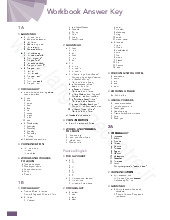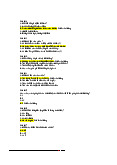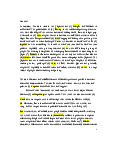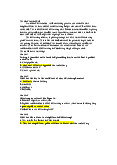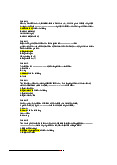






Preview text:
GPS - the Global Positioning System - turns 30 and we'd be lost without it
GPS - the Global Positioning System - turns 30 and we'd be lost without it
It could be one of the most useful pieces of
The system is now based on 37 satellites,
technology the US has gifted to the world and if it
up from its original 24, due to a huge
disappeared much of the planet could well grind
increase in demand. In the continental to a halt.
United States, there will be on average 12
of those satellites overhead, and all 37
GPS satellites are operated and
maintained by the US Space Force.
The Global Positioning System has become a
boon for travellers of all sorts, from cars and
Lt Col Robert Wray continued: "The Space
trucks to shipping and the planet's packed
Force owns and operates GPS, based
airways. It also provides timing data that
outside Colorado Springs, Colorado.
underpins some of the most essential functions of Working 24/7, a team of Guardians,
American and many other societies. GPS
supported by Air Force airmen and
enables electricity from power plants to go to sub
civilians, ensure GPS never fails.
stations and to homes, credit cards to be
processed at gas pumps, and pumping stations 4.
to control pressure of drinking water and wastewater.
He explained that the military personnel
who are key to the system use bases at 1.
Colorado Springs and five other locations
to control the satellites, they update the
Writing in USA Today, Lt Col Robert Wray, an Air
timing and location information throughout
Force & Space Force officer who is commander
each day and that "one of the core
of the 2nd Space Operation Squadron, assigned
missions of the Space Force is to protect
to Schriever Space Force Base in Colorado, said: and defend America’s space assets, like
"Thirty years ago this month marks one of the
GPS". If the system was somehow blocked
most significant technological achievements in
"the consequences would be significant",
modern history, an advance that has reshaped
and that is why the Department of Defense
our daily lives and our sense of security, and are in charge of it.
opened the gates to global commerce that even a
decade before seemed unimaginable. 5. 2.
He said that the most recent satellites
cannot be turned off giving surety of use to
He explained that the timing data GPS provides
all those on the planet who use GPS. And
is the system’s most important capability as it
that is a significant number of the planet's
enables 14 of 16 of the US's critical infrastructure
population, as the US Agency for
sectors and this can be extrapolated to a number
International Development supply
of nations around the world – and that if GPS
GPS-enabled farming equipment that helps
suddenly ceased to function the effects could be
countries feed themselves, while shipping, catastrophic.
aircraft, and commercial trucking use less 3.
fuel, emit less pollution and are far safer because of GPS.
GPS - the Global Positioning System - turns 30 and we'd be lost without it KEY
GPS - the Global Positioning System - turns 30 and we'd be lost without it
It could be one of the most useful pieces of
technology the US has gifted to the world
and if it disappeared much of the planet could well grind to a halt.
The Global Positioning System has become
a boon for travellers of all sorts, from cars
and trucks to shipping and the planet's
packed airways. It also provides timing data
that underpins some of the most essential
functions of American and many other
societies. GPS enables electricity from
power plants to go to sub stations and to
homes, credit cards to be processed at gas
pumps, and pumping stations to control
pressure of drinking water and wastewater.
So it should be celebrated that on December
8, 1993, the system became fully functional
and with it, changed the way the world
works. It opened up new frontiers in global
commerce and has become a lifesaver in
many situations that would have been
considered hopeless previously.
Giải thích: "it” là GPS - the system, "So” là liên từ nối liền nhau.
Writing in USA Today, Lt Col Robert Wray,
an Air Force & Space Force officer who is
commander of the 2nd Space Operation
Squadron, assigned to Schriever Space
Force Base in Colorado, said: "Thirty years
ago this month marks one of the most
significant technological achievements in
modern history, an advance that has
reshaped our daily lives and our sense of
security, and opened the gates to global
commerce that even a decade before seemed unimaginable.
GPS - the Global Positioning System - turns 30 and we'd be lost without it
"Now is the proper moment to fully
appreciate what GPS provides and
acknowledge that even one day without
GPS is a scary prospect. The most obvious
downside is also one of the least important –
without reliable GPS it would be far easier
for drivers, walkers – anyone really – to get
lost. But this marvel of American ingenuity
and tenacity is much more. It is the
foundation of American commerce, safety and defense."
Giải thích: Phần trước đang nói về "modern
history” nên từ phía sau nối là "Now” - thể
hiện sự tương phản về thời gian
He explained that the timing data GPS
provides is the system’s most important
capability as it enables 14 of 16 of the US's
critical infrastructure sectors and this can be
extrapolated to a number of nations around
the world – and that if GPS suddenly ceased
to function the effects could be catastrophic.
Without the system shipping around the
planet would struggle and have to slow to a
near halt as "the choreography of ships and
trucks transporting imported goods is based
on an intricate GPS-derived schedule and
GPS-enabled tracking and co-ordination
software". There would be increased costs
for most goods and services and the world's
airlines would suffer. Even accessing bank
accounts, among many other functions of
daily life that are taken for granted, would become harder.
The system is now based on 37 satellites,
up from its original 24, due to a huge
GPS - the Global Positioning System - turns 30 and we'd be lost without it
increase in demand. In the continental
United States, there will be on average 12 of
those satellites overhead, and all 37 GPS
satellites are operated and maintained by the US Space Force.
Lt Col Robert Wray continued: "The Space
Force owns and operates GPS, based
outside Colorado Springs, Colorado.
Working 24/7, a team of Guardians,
supported by Air Force airmen and civilians, ensure GPS never fails.
"Indeed, in the history of this constellation,
GPS has never failed in its mission to
provide 100 percent global coverage, 100
percent of the time. There are limitations, of
course. GPS is not designed to go
underground or through steel buildings. That
is not a failure. wi-fi routers take the GPS
signal and rebroadcast the timing element of it to minimize disruption."
He explained that the military personnel who
are key to the system use bases at Colorado
Springs and five other locations to control
the satellites, they update the timing and
location information throughout each day
and that "one of the core missions of the
Space Force is to protect and defend
America’s space assets, like GPS". If the
system was somehow blocked "the
consequences would be significant", and
that is why the Department of Defense are in charge of it.
He added: "It's no overstatement to suggest
that GPS represents America’s global
leadership and optimism. President Ronald
Reagan declared in 1983 that GPS would be
free for all world users after the Soviet Union
GPS - the Global Positioning System - turns 30 and we'd be lost without it
shot down a civilian airline that accidentally
crossed into its airspace and President Bill
Clinton pledged that GPS would never be turned off for anyone."
He said that the most recent satellites
cannot be turned off giving surety of use to
all those on the planet who use GPS. And
that is a significant number of the planet's
population, as the US Agency for
International Development supply
GPS-enabled farming equipment that helps
countries feed themselves, while shipping,
aircraft, and commercial trucking use less
fuel, emit less pollution and are far safer because of GPS.
